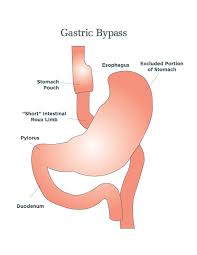Gastric Bypass - Abu Dhabi - Dubai
Gastric bypass surgery, also known as Roux-en-Y gastric bypass, is a surgical procedure performed to help individuals with severe obesity achieve significant and sustainable weight loss. It involves creating a small stomach pouch and rerouting a portion of the small intestine to limit the amount of food you can eat and the calories and nutrients your body absorbs.
Here's a general overview of the gastric bypass procedure:
- 1. Pre-surgery evaluation: Before undergoing gastric bypass surgery, you will undergo a thorough evaluation by a bariatric surgeon. This evaluation typically includes a review of your medical history, physical examination, blood tests, imaging studies, and possibly additional tests to assess your overall health and determine if you are a suitable candidate for the procedure.
- 2. Anesthesia: Gastric bypass surgery is performed under general anesthesia, which means you will be unconscious and pain-free during the procedure.
- 3. Surgical procedure: The surgeon will make several small incisions in your abdomen. They will then use special instruments and a laparoscope (a tiny camera) to perform the surgery. The surgeon will divide the stomach, creating a small pouch at the top that will serve as your new stomach. This restricts the amount of food you can eat.
- 4. Rerouting of the intestine: The surgeon will then divide the small intestine and connect the lower part of the divided small intestine to the small stomach pouch, creating the bypass. The upper part of the divided intestine is then reconnected further down the intestine, allowing digestive juices to mix with food further along the digestive tract.
- 5. Closure and recovery: The surgeon will close the incisions with sutures or surgical staples. After the surgery, you will be taken to a recovery area where medical staff will monitor your vital signs. You will typically stay in the hospital for a few days to ensure a smooth recovery.
- 6. Post-surgery lifestyle changes: Following gastric bypass surgery, you will need to make significant changes to your diet and lifestyle. You will gradually transition from a liquid diet to soft foods and then to solid foods. Portion control and eating smaller meals will be essential to prevent discomfort and maintain weight loss. Regular physical activity and ongoing follow-up with a healthcare team, including dietitians and bariatric specialists, are typically recommended to support your long-term success.
Gastric bypass surgery can lead to significant weight loss and improvement in obesity-related health conditions, such as type 2 diabetes, high blood pressure, and sleep apnea. However, it's important to be aware that the procedure carries risks and potential complications, including infection, bleeding, blood clots, leaks at the surgical site, vitamin and mineral deficiencies, and gastrointestinal issues. It's crucial to have a thorough discussion with your healthcare provider and understand the potential benefits, risks, and long-term implications of gastric bypass surgery before making a decision.
The decision to undergo gastric bypass surgery is typically made in consultation with a multidisciplinary healthcare team, considering your individual circumstances, health status, and previous weight loss efforts.

